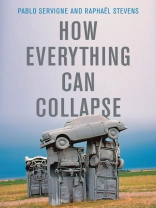What if our civilization were to collapse? Not many centuries into the future, but in our own lifetimes? Most people recognize that we face huge challenges today, from climate change and its potentially catastrophic consequences to a plethora of socio-political problems, but we find it hard to face up to the very real possibility that these crises could produce a collapse of our entire civilization. Yet we now have a great deal of evidence to suggest that we are up against growing systemic instabilities that pose a serious threat to the capacity of human populations to maintain themselves in a sustainable environment.
In this important book, Pablo Servigne and Raphaël Stevens confront these issues head-on. They examine the scientific evidence and show how its findings, often presented in a detached and abstract way, are connected to people’s ordinary experiences – joining the dots, as it were, between the Anthropocene and our everyday lives. In so doing they provide a valuable guide that will help everyone make sense of the new and potentially catastrophic situation in which we now find ourselves. Today, utopia has changed sides: it is the utopians who believe that everything can continue as before, while realists put their energy into making a transition and building local resilience. Collapse is the horizon of our generation. But collapse is not the end – it’s the beginning of our future. We will reinvent new ways of living in the world and being attentive to ourselves, to other human beings and to all our fellow creatures.
Table of Content
Foreword
Acknowledgements
Introduction: We’ll Definitely Need to Tackle the Subject One of These Days …
Collapse?
The birth of ‘collapsology’
Beware, this is a sensitive subject!
Notes
Part I The Harbingers of Collapse
1 The Accelerating Vehicle
A world of exponentials
Total acceleration
Where do the limits lie?
Notes
2 When the Engine Dies (Limits that Cannot be Crossed)
At the top of the peak, does energy starts to fall?
At the top of the peak, there is a wall!
And before the wall … a precipice
Notes
3 Leaving the Road (Boundaries that Can be Crossed)
Global heating and cold sweats
Who will kill the last animal on the planet?
The other boundaries of the planet
What happens when we cross different Rubicons?
Notes
4 Is the Steering Locked?
How a system becomes locked in
The problem of complexity
Notes
5 Trapped in an Ever More Fragile Vehicle
Finance: feet of clay
Supply chains on the razor’s edge
Infrastructures at their last gasp
What will be the spark?
Notes
Summary of Part I
An all-too-clear picture
Notes
Part II So, When’s It Going to Happen:?
6 The Difficulties of Being a Futurologist
From risk assessment to intuition
The paradoxes of collapse
Notes
7 Can We Detect Warning Signs?
The ‘noise’ of a system about to collapse
There will always be uncertainty
Notes
8 What Do the Mathematical Models Say?
An original model: HANDY
A robust model: World3
Notes
Part III Collapsology
9 A Mosaic to Explore
What are we talking about exactly?
What do past civilizations tell us … ?
How far are we sinking … ?
… up to our necks?
Notes
10 And Where Do Human Beings Fit into All This?
How many of us will there be at the end of the century? The demography of collapse
Will we kill each other off? The sociology of collapse
Why do most people not believe it will happen? The psychology of collapse
Now that we believe in it, what shall we do? The politics of collapse
Notes
Conclusion: Hunger is Only the Beginning
Towards a general and applied collapsology
The ‘hangover’ generation
Other ways of partying
Notes
‘For the Children’
Notes
Postscript
Notes
About the author
Pablo Servigne is an agronomist with a Ph D in biology. He is a specialist in questions of collapse, transition, agro-ecology and mutual aid.
Raphaël Stevens is an eco-adviser. An expert in the resilience of socio-ecological systems, he is cofounder of the consultancy agency Greenloop.












